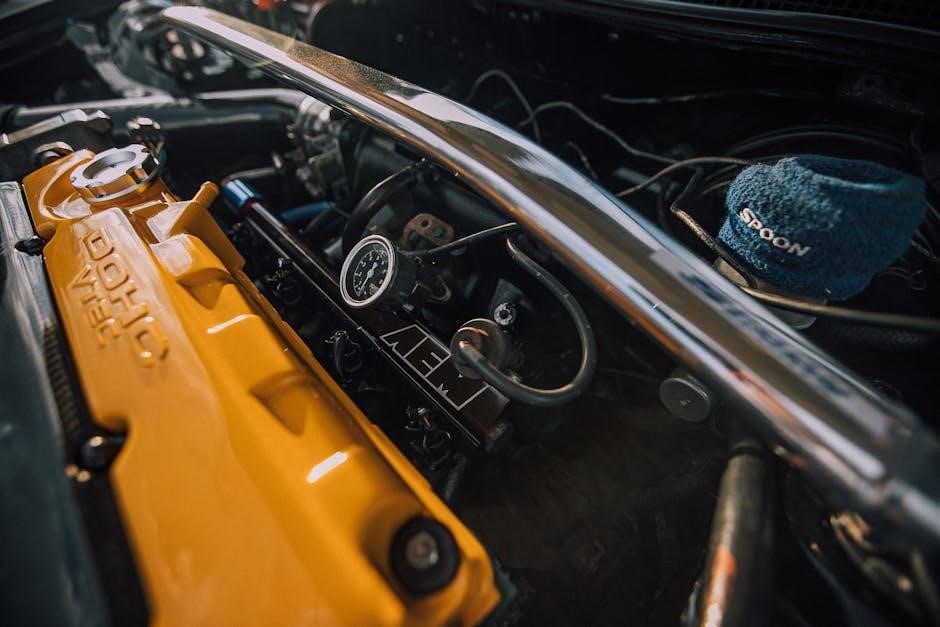2014 Honda Accord Maintenance Schedule Overview
Maintaining your 2014 Honda Accord is crucial for its longevity and performance. Unlike traditional schedules, Honda uses a Maintenance Minder system. This system adapts to your driving habits, indicating when services are needed, promoting optimal vehicle health.
Understanding the Maintenance Minder System
The 2014 Honda Accord utilizes the Maintenance Minder system, an intelligent feature that replaces the traditional, fixed maintenance schedule. This system monitors various factors, including engine speed, operating temperature, and driving conditions, to determine when specific maintenance tasks are required. Instead of adhering to mileage-based intervals, the Maintenance Minder displays codes that correspond to different service needs.
When the “Service Due Now” message appears, along with a letter and number code (e.g., A1, B2), it indicates the necessary maintenance. “A” typically signifies an oil change, while “B” includes oil change plus inspections. Numbers represent other services like tire rotations, filter replacements, or brake inspections. This system provides flexibility, tailoring maintenance to your actual driving habits and environmental conditions.
The Maintenance Minder promotes proactive car care by alerting you to potential issues before they escalate. It also helps optimize maintenance intervals, potentially saving you money and time. Remember to consult your owner’s manual for specific code definitions and recommended services to ensure proper care for your Accord.

Key Maintenance Intervals
While the Maintenance Minder dictates specific needs, understanding general intervals is helpful. Services often cluster around 7,500, 15,000, and 30,000-mile marks. These intervals serve as a basic guideline for anticipating potential maintenance needs.
7,500 Mile Service
At approximately 7,500 miles, your 2014 Honda Accord will likely require its initial service visit. This service is crucial for maintaining optimal performance. The primary task is an oil change, using the recommended 0W-20 synthetic oil. Along with the oil change, the oil filter must be replaced to ensure clean oil circulates through the engine.
Additionally, this service interval includes a tire rotation. Rotating your tires promotes even wear, extending their lifespan and improving handling. The technician will also inspect tire pressure and adjust it as needed. A general inspection of various components is standard. This often includes checking fluid levels such as brake fluid, coolant, and windshield washer fluid. The exhaust system, fuel lines, and connections are also visually inspected for leaks or damage.
This comprehensive check-up at 7,500 miles helps identify potential issues early, preventing more costly repairs down the road.
15,000, 30,000, 45,000 Mile Services
As your 2014 Honda Accord accumulates mileage, the 15,000, 30,000, and 45,000-mile service intervals become increasingly important. These services build upon the foundation established at the 7,500-mile mark, ensuring continued reliability. At each of these intervals, you can expect an oil change and filter replacement, along with tire rotation and pressure adjustments.
Furthermore, these services include more in-depth inspections. The brake system undergoes scrutiny, checking pad thickness and rotor condition. Air and cabin filters are often replaced to maintain optimal air quality and engine performance. At 30,000 miles, more extensive maintenance might include inspecting and potentially replacing fluids like transmission fluid, depending on driving conditions. These services are vital to the overall health of the vehicle.
Ignoring these scheduled services can lead to diminished performance, decreased fuel efficiency, and potentially costly repairs in the future. Adhering to the recommended schedule is crucial for keeping your Accord running smoothly.

Essential Maintenance Tasks
Several maintenance tasks are essential for preserving your 2014 Honda Accord; These include regular oil changes, tire rotations, brake inspections, and fluid checks. These tasks contribute significantly to the vehicle’s longevity and overall performance.
Oil Changes and Filter Replacements
Regular oil changes and filter replacements are paramount for maintaining your 2014 Honda Accord’s engine health. The Maintenance Minder system will indicate when an oil change is necessary, typically displaying a code. Modern engine oils, especially synthetic blends or full synthetics like 0W-20 (recommended for the 2014 Accord), can last significantly longer than conventional oils. However, it’s crucial to adhere to the Maintenance Minder’s recommendations.
During an oil change, the old oil and oil filter are removed and replaced with fresh oil and a new filter. This process removes contaminants that accumulate over time, ensuring optimal engine lubrication and cooling. Using the correct type of oil and a high-quality filter is essential for protecting your engine from wear and tear.
Ignoring oil change intervals can lead to sludge buildup, reduced engine performance, and potentially costly repairs. Therefore, adhering to the Maintenance Minder’s prompts and using the recommended oil type are crucial for maximizing the lifespan of your 2014 Honda Accord’s engine.
Tire Rotation and Inspection

Tire rotation and inspection are vital for ensuring even tire wear and maximizing the lifespan of your 2014 Honda Accord’s tires. Regular rotation helps to distribute wear evenly across all four tires, as front and rear tires typically experience different wear patterns due to factors like steering and drivetrain configuration. The Maintenance Minder system will often indicate the need for tire rotation with a specific service code.
During a tire rotation, the tires are moved from one position on the vehicle to another, following a specific pattern recommended by Honda. This helps to equalize wear and extend the life of the tires. In addition to rotation, a thorough inspection of the tires is essential. This includes checking for signs of wear, such as uneven tread depth, sidewall damage, and embedded objects.
Proper tire inflation is also crucial for optimal performance and safety. The recommended tire pressure can be found on a sticker located on the driver’s side doorjamb. Maintaining the correct tire pressure improves fuel efficiency, handling, and braking performance. Neglecting tire rotation and inspection can lead to premature tire wear, reduced fuel economy, and compromised safety.
Brake Service
Proper brake service is paramount for the safety and reliable operation of your 2014 Honda Accord. The brake system is responsible for slowing down and stopping the vehicle, so maintaining its components is critical. The Maintenance Minder system will alert you when brake service is needed, typically indicated by specific service codes. Regular brake inspections are recommended to assess the condition of brake pads, rotors, calipers, and brake lines.
During a brake service, the brake pads are inspected for wear and replaced if they are below the minimum thickness. The rotors are also checked for damage, such as cracks or excessive wear, and resurfaced or replaced if necessary. The calipers are inspected for proper function and lubricated to ensure smooth operation. Brake lines are examined for leaks or damage, and the brake fluid is checked for contamination and moisture content.
Brake fluid should be flushed and replaced at recommended intervals to maintain its effectiveness. Contaminated brake fluid can lead to reduced braking performance and corrosion of brake components. Neglecting brake service can result in reduced braking efficiency, increased stopping distances, and potentially dangerous driving conditions. Regular brake service ensures that your 2014 Honda Accord’s braking system is in optimal condition, providing safe and reliable stopping power.

Additional Maintenance Considerations
Beyond the standard intervals, consider driving conditions. Severe conditions, such as frequent short trips or extreme temperatures, may necessitate more frequent maintenance. Regular fluid checks and timely replacements are also crucial for preserving your Accord’s performance and lifespan.
Severe Driving Conditions
If you frequently drive under severe conditions, such as stop-and-go traffic, dusty roads, or extreme temperatures, your 2014 Honda Accord may require more frequent maintenance. These conditions can accelerate wear and tear on various components, potentially shortening their lifespan.
Consider adjusting your maintenance schedule if you often drive short distances, as the engine may not reach optimal operating temperature. Towing a trailer or carrying heavy loads also constitutes severe usage. Regularly check your engine oil, coolant, brake fluid, and transmission fluid levels. Monitor tire pressure and condition more closely, too.
Consult your owner’s manual for specific recommendations on adjusting your maintenance schedule based on your driving conditions. Following these guidelines ensures optimal performance and longevity for your 2014 Honda Accord, even under challenging conditions. Prompt attention prevents future costly repairs.
Fluid Checks and Replacements
Regularly checking and replacing fluids in your 2014 Honda Accord is vital for maintaining its optimal performance and preventing costly repairs. Key fluids to monitor include engine oil, coolant, brake fluid, power steering fluid, and transmission fluid.
Engine oil should be checked regularly and replaced according to the Maintenance Minder system’s alerts or at least once a year if alerts don’t appear. Coolant should be inspected for proper level and condition, typically replaced every few years. Brake fluid attracts moisture over time, reducing its effectiveness; replacement is recommended every three years.
Power steering fluid should be checked for leaks and proper level, replacing if contaminated or low. Transmission fluid is crucial for smooth shifting; follow Honda’s recommendations for drain and refill intervals, around 30,000 miles. Routine fluid checks and replacements ensures the longevity of components.
